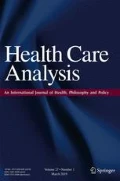Abstract
For many individuals, religious traditions provide important resources for moral deliberation. While contemporary philosophical approaches in bioethics draw upon secular presumptions, religion continues to play an important role in both personal moral reasoning and public debate. In this analysis, I consider the connections between religious traditions and understandings of morality, medicine, illness, suffering, and the body. The discussion is not intended to provide a theological analysis within the intellectual constraints of a particular religious tradition. Rather, I offer an interpretive analysis of how religious norms often play a role in shaping understandings of morality. While many late 19th and early 20th century social scientists predicted the demise of religion, religious traditions continue to play important roles in the lives of many individuals. Whether bioethicists are sympathetic or skeptical toward the normative claims of particular religious traditions, it is important that bioethicists have an understanding of how religious models of morality, illness, and healing influence deliberations within the health care arena.
Similar content being viewed by others
References
Becker, C.B. (1990, October) Buddhist Views of Suicide and Euthanasia. Philosophy East and West 40(4), 543–555.
Berger, P.L. (1967) The Sacred Canopy: Elements of a Sociological Theory of Religion. New York: Doubleday.
Brock, D.W. (1995) Public Moral Discourse. In R.E. Bulger, E.M. Bobby and H.V. Fineberg (Eds.), Society's Choices: Social and Ethical Decision Making in Biomedicine (pp. 215-240). Washington, DC: National Academy Press.
Cahill, L.S. (1990) Can Theology Have a Role in ‘Public’ Bioethical Discourse? Hastings Center Report July/August, 10–14.
Campbell, C.S. (1990) Religion and Moral Meaning in Bioethics. Hastings Center Report July/August, 4–10.
Campbell, C.S. (1992) Religious Ethics and Active Euthanasia in a Pluralistic Society. Kennedy Institute of Ethics Journal 2(3), 253–277.
Carter, S.L. (1993) The Culture of Disbelief: How American Law and Politics Trivialize Religious Devotion. New York: Basic Books.
Davis, D.S. and Zoloth, L. (1999) Notes from a Narrow Ridge: Religion and Bioethics. Hagerstown, MD: University Publishing Group.
Declaration of the Sacred Congregation for the Doctrine of the Faith (1980, 5 May). The Pope Speaks 25(Winter): 289-296. Reprinted in Lammers, S. E. and Verhey, A. (1987) On Moral Medicine: Theological Perspectives in Medical Ethics (pp. 441–444) Grand Rapids, MI: William B. Eerdmans.
Dorff, E.N. (1996) The Jewish Tradition: Religious Beliefs and Health Care Decisions. Chicago: Park Ridge Center.
Ebaugh, H.R. (2002) Return of the Sacred: Reintegrating Religion in the Social Sciences. Journal for the Scientific Study of Religion 41(3), 385–395.
Engelhardt, H.T. Jr. (1994) Bioethics in the Post-Modern World: Belief and Secularity. In C. S. Campbell and A. Lustig (Eds.), Duties to Others (pp. 235-245). Boston: Kluwer Academic.
Engelhardt, H.T. Jr. (1989) Fashioning an Ethic for Life and Death in a Post-Modern Society. Hastings Center Report January/February, 7–9.
Fins, J.J. (1994) Encountering Diversity: Medical Ethics and Pluralism. Journal of Religion and Health 33(1, Spring), 23–27.
Fins, J.J. (1995) Across the Divide: Religious Objections to Brain Death. Journal of Religion and Health 34(1, Spring), 33–39.
Florida, R.E. (1993) Buddhist Approaches to Euthanasia. Studies in Religion/Sciences Religieuses 22(1), 35–47.
Geertz, C. (1973) The Interpretation of Cultures. New York: Basic Books.
Geertz, C. (1983) Local Knowledge: Further Essays in Interpretive Anthropology. New York: Basic Books.
Gualtieri, A.R. (1993) Religious Cosmologies as Justifications of Moralities. Studies in Religion/ Sciences Religieuses 22(1), 21–33.
Gustafson, J.M. (1975) The Contributions of Theology to Medical Ethics. Milwaukee, WI: Marquette University Press.
Hunter, J.D. (1991) Culture Wars: The Struggle to Define America. New York: Basic Books.
MacIntyre, A. (1990) Three Rival Versions of Moral Enquiry: Encyclopaedia, Geneology, and Tradition. Notre Dame, IN: University of Notre Dame Press.
Minogue, B.P. (1990) The Exclusion of Theology from Public Policy: The Case of Euthanasia. Second Opinion 14, 85–93.
Orsi, R.A. (2003) Is the Study of Lived Religion Irrelevant to the World we Live In? Journal for the Scientific Study of Religion 42(2), 169–174.
Rorty, R. (1999) Philosophy and Social Hope. New York: Penguin Books.
Weber, M. ([1922] 1991) The Sociology of Religion. Boston: Beacon Press.
Wildes, K.W.S.J. (1992) The Priesthood of Bioethics and the Return of Casuistry. The Journal of Medicine and Philosophy 18(1993), 33–49.
Wuthnow, R. (1992) Rediscovering the Sacred: Perspectives on Religion in Contemporary Society. Grand Rapids, MI: William B. Eerdmans.
Author information
Authors and Affiliations
Rights and permissions
About this article
Cite this article
Turner, L. Bioethics and Religions: Religious Traditions and Understandings of Morality, Health, and Illness. Health Care Analysis 11, 181–197 (2003). https://doi.org/10.1023/B:HCAN.0000005491.88004.27
Issue Date:
DOI: https://doi.org/10.1023/B:HCAN.0000005491.88004.27




